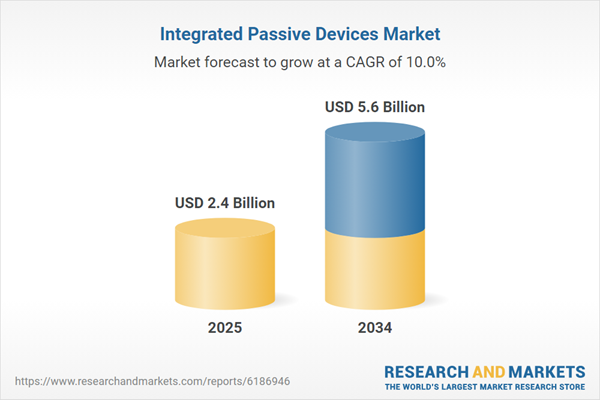The Integrated Passive Devices (IPD) market has become increasingly vital to the evolution of miniaturized electronics, particularly as the demand for smaller, more efficient, and higher-performing components grows. IPDs integrate passive elements such as resistors, capacitors, and inductors into a single chip, helping to reduce the footprint, improve electrical performance, and enhance reliability. This technology is widely utilized in high-frequency applications, including smartphones, wearables, automotive electronics, and wireless communication modules. With the relentless pursuit of miniaturization and multifunctionality in electronics, IPDs have emerged as a cornerstone technology. The market has seen consistent growth, supported by developments in advanced packaging, 5G infrastructure, and RF front-end modules. Leading players continue to invest in R&D to develop IPDs with higher integration density and better signal integrity. As the semiconductor industry shifts toward heterogeneous integration, IPDs serve as a crucial enabler for high-performance and compact electronic systems, especially in RF and millimeter-wave domains.
The IPD market witnessed heightened activity driven by the rapid commercialization of 5G and a surge in connected devices across consumer electronics and automotive sectors. Leading semiconductor manufacturers expanded production capacities, while startups focused on design innovation and foundry collaboration. Notably, several European and Asian players ramped up IPD-related investments to gain competitive advantage in RF system design. The automotive sector emerged as a key vertical, with IPDs gaining traction in advanced driver assistance systems (ADAS), infotainment, and vehicle-to-everything (V2X) communications. Supply chain normalization post-pandemic also contributed to smoother design-to-market transitions. Furthermore, collaborations between foundries and fabless firms helped standardize IPD manufacturing platforms, reducing development cycles. The integration of IPDs into system-in-package (SiP) modules gained momentum, particularly in applications demanding compactness and performance at high frequencies. Additionally, government-backed initiatives promoting local chip manufacturing indirectly supported the IPD landscape by encouraging semiconductor ecosystem expansion. The year saw strong IPD adoption in Asia-Pacific, especially in South Korea and Taiwan, where packaging innovation remains a strategic focus.
The Integrated Passive Devices market is poised for accelerated transformation driven by the convergence of 6G research, quantum computing readiness, and increasingly complex RF designs. The growing need for IPDs in satellite communication systems and emerging domains such as biomedical implants and wearable diagnostics will drive diversified use cases. Technological breakthroughs are expected in substrate material innovation and low-loss dielectric designs to support ultra-high-frequency signal transmission. Moreover, the evolution of artificial intelligence and edge computing will place additional performance demands on IPDs used in data routing and signal conditioning within compact modules. The introduction of chiplet architectures and advanced interposers may open new integration avenues, furthering IPD relevance in next-gen packaging technologies. As environmental sustainability gains momentum, there will be increased emphasis on eco-friendly IPD manufacturing and energy-efficient component design. Emerging markets in Southeast Asia, Latin America, and parts of Eastern Europe are likely to become hotspots for IPD deployment as electronics manufacturing becomes more regionally distributed. With a growing ecosystem of foundries, design houses, and materials providers, the IPD market is set to become a key enabler of future microelectronic systems across consumer, industrial, aerospace, and medical sectors.
Key Insights: Integrated Passive Devices Market
- The analyst observes that increasing reliance on RF front-end modules for 5G devices is accelerating IPD integration, as the technology ensures signal fidelity and minimizes component losses at high frequencies.
- The analyst highlights the rise of ultra-thin IPDs tailored for wearable and implantable medical devices, allowing improved patient mobility and real-time diagnostics without compromising device lifespan or size.
- The analyst notes a surge in demand for IPDs with integrated electromagnetic interference (EMI) filtering, especially in electric vehicles and industrial IoT applications requiring robust noise immunity.
- The analyst identifies an uptick in hybrid packaging techniques combining IPDs with active chips on a single substrate, boosting performance in compact modules like smartphones and AR/VR devices.
- The analyst points to increasing investment in AI-assisted IPD design automation, helping design engineers shorten time-to-market and improve precision in complex system simulations.
- The analyst explains that the miniaturization of electronic devices across smartphones, medical tools, and IoT gadgets is driving the need for IPDs, as they reduce circuit size while enhancing electrical characteristics.
- The analyst notes the adoption of high-frequency applications in automotive radar and V2X communications is pushing IPD deployment due to their superior performance at millimeter-wave frequencies.
- The analyst indicates that IPDs contribute to thermal efficiency and better power management, making them a preferred choice for high-density, power-sensitive systems like drones and edge servers.
- The analyst emphasizes that the proliferation of system-in-package (SiP) and heterogeneous integration strategies in semiconductor manufacturing is significantly bolstering IPD integration across chip ecosystems.
- The analyst cautions that design complexity and standardization issues in IPD manufacturing often hinder scalability, particularly for mid-sized firms lacking access to advanced EDA tools or dedicated foundries.
- The analyst notes that fluctuations in raw material availability and costs, especially for high-purity substrates, present challenges for IPD manufacturers aiming for consistent high-frequency performance and volume production.
Integrated Passive Devices Market Segmentation
By Material
- Silicon
- Glass
- Other Materials
By Passive Devices
- Baluns
- Filter
- Couplers
- Diplexers
- Customized Integrated Passive Devices
- Other Passive Devices
By Packaging
- Wire Bonding
- Single In-Line Package (SIL)
- Quad Flat No Lead (QFN)
- Chip-Scale Package
- Wafer Level Package
- Other Packagings
By Application
- Electrostatic Discharge (ESD) Or Electromagnetic interference (EMI)
- RF Integrated Passive Device
- Digital and Mixed Signals
- Other Applications
By End-Use
- Consumer Electronics
- Automotive
- Communication
- Aerospace and Defense
- Healthcare and Life Sciences
Key Companies Analysed
- Infineion Technologies AG
- STMicroelectronics N.V.
- Murata Manufacturing Co. Ltd.
- Johanson Technology Inc.
- OnChip Devices Inc.
- STATS ChipPAC Corp.
- ON Semiconductor Corp.
- Infineon AG
- Global Communication Semiconductors
- Advanced Furnace Systems
- Broadcom Inc.
- Skyworks Solutions Inc.
- Texas Instruments Inc.
- Micron Technology Inc.
- NXP Semiconductors NV
- Vishay Intertechnology Inc.
- TDK Corporation
- Taiyo Yuden Co. Ltd.
- AVX Corporation
- Samsung Electro-Mechanics Co. Ltd.
- Panasonic Corporation
- Yageo Corporation
- Walsin Technology Corporation
- Chilisin Electronics Corp.
- Coilcraft Inc.
- Pulse Electronics Corp.
- Token Electronics Industry Co. Ltd.
- Integrated Passive Component Technologies Corp.
- KEMET Corporation
- Maxim Integrated Products Inc.
- Renesas Electronics Corporation.
Integrated Passive Devices Market Analytics
The report employs rigorous tools, including Porter’s Five Forces, value chain mapping, and scenario-based modeling, to assess supply-demand dynamics. Cross-sector influences from parent, derived, and substitute markets are evaluated to identify risks and opportunities. Trade and pricing analytics provide an up-to-date view of international flows, including leading exporters, importers, and regional price trends.Macroeconomic indicators, policy frameworks such as carbon pricing and energy security strategies, and evolving consumer behavior are considered in forecasting scenarios. Recent deal flows, partnerships, and technology innovations are incorporated to assess their impact on future market performance.
Integrated Passive Devices Market Competitive Intelligence
The competitive landscape is mapped through proprietary frameworks, profiling leading companies with details on business models, product portfolios, financial performance, and strategic initiatives. Key developments such as mergers & acquisitions, technology collaborations, investment inflows, and regional expansions are analyzed for their competitive impact. The report also identifies emerging players and innovative startups contributing to market disruption.Regional insights highlight the most promising investment destinations, regulatory landscapes, and evolving partnerships across energy and industrial corridors.
Countries Covered
- North America - Integrated Passive Devices market data and outlook to 2034
- United States
- Canada
- Mexico
- Europe - Integrated Passive Devices market data and outlook to 2034
- Germany
- United Kingdom
- France
- Italy
- Spain
- BeNeLux
- Russia
- Sweden
- Asia-Pacific - Integrated Passive Devices market data and outlook to 2034
- China
- Japan
- India
- South Korea
- Australia
- Indonesia
- Malaysia
- Vietnam
- Middle East and Africa - Integrated Passive Devices market data and outlook to 2034
- Saudi Arabia
- South Africa
- Iran
- UAE
- Egypt
- South and Central America - Integrated Passive Devices market data and outlook to 2034
- Brazil
- Argentina
- Chile
- Peru
Research Methodology
This study combines primary inputs from industry experts across the Integrated Passive Devices value chain with secondary data from associations, government publications, trade databases, and company disclosures. Proprietary modeling techniques, including data triangulation, statistical correlation, and scenario planning, are applied to deliver reliable market sizing and forecasting.Key Questions Addressed
- What is the current and forecast market size of the Integrated Passive Devices industry at global, regional, and country levels?
- Which types, applications, and technologies present the highest growth potential?
- How are supply chains adapting to geopolitical and economic shocks?
- What role do policy frameworks, trade flows, and sustainability targets play in shaping demand?
- Who are the leading players, and how are their strategies evolving in the face of global uncertainty?
- Which regional “hotspots” and customer segments will outpace the market, and what go-to-market and partnership models best support entry and expansion?
- Where are the most investable opportunities - across technology roadmaps, sustainability-linked innovation, and M&A - and what is the best segment to invest over the next 3-5 years?
Your Key Takeaways from the Integrated Passive Devices Market Report
- Global Integrated Passive Devices market size and growth projections (CAGR), 2024-2034
- Impact of Russia-Ukraine, Israel-Palestine, and Hamas conflicts on Integrated Passive Devices trade, costs, and supply chains
- Integrated Passive Devices market size, share, and outlook across 5 regions and 27 countries, 2023-2034
- Integrated Passive Devices market size, CAGR, and market share of key products, applications, and end-user verticals, 2023-2034
- Short- and long-term Integrated Passive Devices market trends, drivers, restraints, and opportunities
- Porter’s Five Forces analysis, technological developments, and Integrated Passive Devices supply chain analysis
- Integrated Passive Devices trade analysis, Integrated Passive Devices market price analysis, and Integrated Passive Devices supply/demand dynamics
- Profiles of 5 leading companies - overview, key strategies, financials, and products
- Latest Integrated Passive Devices market news and developments
Additional Support
With the purchase of this report, you will receive:- An updated PDF report and an MS Excel data workbook containing all market tables and figures for easy analysis.
- 7-day post-sale analyst support for clarifications and in-scope supplementary data, ensuring the deliverable aligns precisely with your requirements.
- Complimentary report update to incorporate the latest available data and the impact of recent market developments.
This product will be delivered within 1-3 business days.
Table of Contents
Companies Mentioned
- Infineion Technologies AG
- STMicroelectronics N.V.
- Murata Manufacturing Co. Ltd.
- Johanson Technology Inc.
- OnChip Devices Inc.
- STATS ChipPAC Corp.
- ON Semiconductor Corp.
- Infineon AG
- Global Communication Semiconductors
- Advanced Furnace Systems
- Broadcom Inc.
- Skyworks Solutions Inc.
- Texas Instruments Inc.
- Micron Technology Inc.
- NXP Semiconductors NV
- Vishay Intertechnology Inc.
- TDK Corporation
- Taiyo Yuden Co. Ltd.
- AVX Corporation
- Samsung Electro-Mechanics Co. Ltd.
- Panasonic Corporation
- Yageo Corporation
- Walsin Technology Corporation
- Chilisin Electronics Corp.
- Coilcraft Inc.
- Pulse Electronics Corp.
- Token Electronics Industry Co. Ltd.
- Integrated Passive Component Technologies Corp.
- KEMET Corporation
- Maxim Integrated Products Inc.
- Renesas Electronics Corporation .
Table Information
| Report Attribute | Details |
|---|---|
| No. of Pages | 160 |
| Published | October 2025 |
| Forecast Period | 2025 - 2034 |
| Estimated Market Value ( USD | $ 2.4 Billion |
| Forecasted Market Value ( USD | $ 5.6 Billion |
| Compound Annual Growth Rate | 9.9% |
| Regions Covered | Global |
| No. of Companies Mentioned | 31 |









